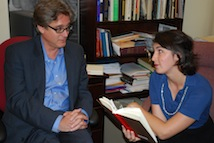Diary of Electra

Diary of Electra, Entry 4
Music
In addition to a new translation and original choreography, our show is lucky enough to have its own musical score, created by local composer Elliot Cole. The score will be played on an eclectic assortment of instruments—a harmonium, vibraphone, flute with pedal board, harp, drums, and laptop—by three musicians sitting on stage in view of the audience. Their music, composed line-by-line according to the script and the pre-existing choreography, shapes a landscape for the other elements of the play to inhabit. Listen to clips from the score and hear Elliot talk about the process.
Elliot Cole holds a Bachelor of Music from the Shepherd School and a Bachelor of Arts in Cognitive Science from Rice University in Houston, Texas. Mr. Cole writes new classical music, chamber pop, and hip hop beats as well as music for theater. For more of his music, visit elliotcole.com/music.
Yours from the studio,
Katelyn
Diary of Electra, Entry 3
Building Beyond the Text—Episode 1
What is an actor’s obligation to his script? Does the script contain everything an actor or director needs to bring the play to life? What should they do when they encounter the limitations of the script?
It is crucial for our actors to understand the words on the pages of their scripts. They should know the story, the characters and their relationships, and the thematic knots that need teasing out. To discover all of that and to be able to present it to an audience, they must deeply explore the play, much like students are asked to analyze a text and then argue their interpretation. The difference is that students are expected to stop at the limits of the text while actors and directors have the freedom to go beyond.
Our spare, poetic translation of Electra leaves us room to imagine the world surrounding the play, fill in dialogues that do not occur on stage, and even invent plausible motives for events in the play. (My favorite invention so far is that Clytemnestra has just become pregnant with Aegisthus’ baby, which explains why they have chosen now, the moment of the play, to plot Electra’s death.)
One way the group builds beyond the text is with an imaging exercise each rehearsal. In imaging, one member of the group leads the rest to strip away their reality and then build up a new one in their minds—perhaps the plain at Argos, the palace where Electra lives, or the crowded streets following the murders of Clytemnestra and Aegisthus. The script doesn’t tell us anything about the plain, the palace, or the streets, or what the townspeople do after Orestes kills their king and queen, but because of the imaging exercises, each of the cast members has a clear picture of those places and events in their minds. You can hear Andy and Mark talk more about building beyond the text and imaging in our video diary.
Yours from the studio,
Katelyn
Diary of Electra, Entry 2
With the show cast, it’s time to begin working!
In Electra, everyone on stage is tied closely to the House of Atreus, either by blood or by long-term association. Our cast, mostly strangers to one another, will need to convince an audience of that in just two short months, not only with their speech but also with their actions. With so much for the cast to discover about the play and their fellow actors, it’s too soon for me to give them set, choreographed movement; they need to explore their range of motion and group interaction organically.
We start our rehearsal process with dance improvisation games that emphasize either weight-sharing or group dynamics. In the weight-sharing game, one partner forms a post with his or her body, and the other investigates ways to give over some of his or her weight using different points of contact and creating different shapes and motions. In the group dynamic game, called Flocking, everyone mimics the movement of the person in front of him or her; the person who can see no one else is the leader. The role of leader shifts fluidly in the game, with the principal goal being to keep the group moving together. Take a look at some of our improvisation.
Eventually, we will use the group’s connectivity to inform the chorus’ choreography, which will feature individual impulses traveling through the entire group as if they were one organism, a la Doris Humphrey’s “Water Study.” It’s a gem.
Yours from the studio,
Katelyn
Diary of Electra, Entry 1
Welcome to the first entry in the Diary of Electra! Throughout our rehearsal process Dr. John Harvey (translator and director) and I (Katelyn Halpern, choreographer and assistant director) will keep you up to date on the latest Electra news, including photos and video when we can. All of this work is leading up to our show, which opens in late March—I hope to see you there! But I’m jumping the gun…
On Friday, January 22, we held auditions for the roles of Orestes—the son who comes home to kill his mother and her boyfriend—and Chrysothemis—Orestes’ younger, level-headed sister who has learned to live with the situation (something their older sister Electra has not been able to do). We also looked for dancers and actors to make up the Greek chorus. Students from across the UH campus read from Dr. Harvey’s script and sweated it out in a dance audition, and at the end of the day we cast a great show.
In the Diary you’ll be hearing from our cast and crew. Today you can take a look at a few of our chorus members (and Orestes) reading in their auditions. Stay tuned for more soon!
Yours from the studio,
Katelyn